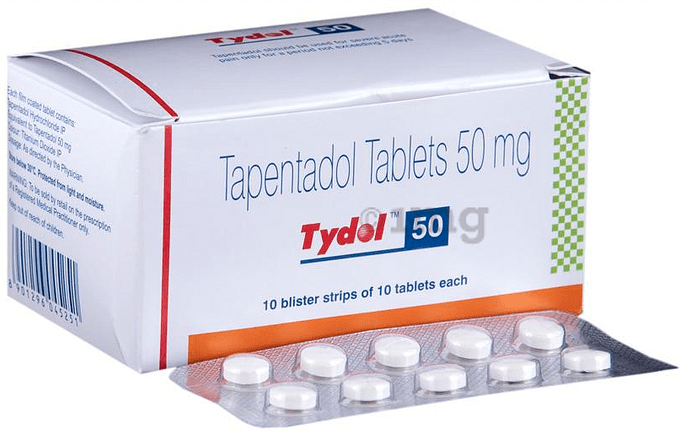What is Tapentadol?
Tapentadol is a narcotic (opioid) pain killer medication. Also known as Nucynta.
Its potency is between morphine and tramadol. It has been approved for use by the FDA in acute, moderate-severe or chronic pain, in the form of immediate-release tablets.
Tapentadol may also be used for purposes not listed in this medication guide.
Its mechanism of action is dual, agonist in the mu opioid receptor of the CNS and inhibitor of noradrenaline reuptake.The dual pharmacological action of tapentadol allows it to be at the analgesic level of oxycodone, hydrocodone and meperidine with better tolerated side effects.
REMEMBER: Like all opioids, they demand a close follow-up and be aware of their potential.
Important information
You should not take tapentadol if you have used alcohol, sedatives, tranquilizers, or narcotic medications within the past few hours.Tapentadol can slow or stop your breathing, especially when you start using this medicine or whenever your dose is changed. Never take Tapentadol for longer than prescribed or in larger amounts. Tapentadol may be more likely to cause a seizure if you have a history of seizures or head injury, a metabolic disorder, or if you are taking certain medicines such as antidepressants, muscle relaxers, narcotic, or medicine for nausea and vomiting.Tapentadol may be habit-forming, even at regular doses. Take this medicine exactly as prescribed by your doctor. Never share the medicine with another person. MISUSE OF NARCOTIC PAIN MEDICATION CAN CAUSE ADDICTION, OVERDOSE, OR DEATH, especially in a child or other person using the medicine without a prescription.Tell your doctor if you are pregnant. Tapentadol may cause life-threatening withdrawal symptoms in a newborn.Do not drink alcohol. Dangerous side effects or death can occur when alcohol is combined with tapentadol. This medicine is for oral (by mouth) use only. Powder from a crushed tablet should not be inhaled or diluted with liquid and injected into the body. Using this medicine by inhalation or injection can cause life-threatening side effects, overdose, or death.
Before taking this medicine:Tell your doctor and pharmacist what other prescription and nonprescription medications, vitamins, nutritional supplements, and herbal products you are taking or plan to take. Be sure to mention any of the following: antihistamines (in cough, cold, and allergy medications); buprenorphine (Buprenex, Butrans, in Suboxone, in Zubsolv); butorphanol; cyclobenzaprine (Amrix); dextromethorphan (found in many cough medications; in Nuedexta); medications for irritable bowel disease, motion sickness, Parkinson's disease, ulcers, or urinary problems; lithium (Lithobid); medications for migraines such as almotriptan (Axert), eletriptan (Relpax), frovatriptan (Frova), naratriptan (Amerge), rizatriptan (Maxalt), sumatriptan (Imitrex, in Treximet), and zolmitriptan (Zomig); mirtazapine (Remeron); nalbuphine; pentazocine (Talwin); selective serotonin reuptake inhibitors (SSRIs) such as citalopram (Celexa), escitalopram (Lexapro), fluoxetine (Prozac, Sarafem, Selfemra, in Symbyax), fluvoxamine (Luvox), paroxetine (Brisdelle, Paxil, Pexeva), and sertraline (Zoloft); selective serotonin/norepinephrine reuptake inhibitors (SNRIs) such as desvenlafaxine (Khedezla, Pristiq), duloxetine (Cymbalta), milnacipran (Savella), and venlafaxine (Effexor); tramadol (Conzip, Ultram, in Ultracet); trazodone; or tricyclic antidepressants ('mood elevators') such as amitriptyline, amoxapine, clomipramine (Anafranil), desipramine (Norpramin), doxepin (Silenor, Zonalon), imipramine (Surmontil, Tofranil), nortriptyline (Pamelor), protriptyline (Vivactil), and trimipramine (Surmontil). Many other medications may also interact with tapentadol, so be sure to tell your doctor about all the medications you are taking, even those that do not appear on this list. Your doctor may need to change the doses of your medications or monitor you carefully for side effects.Tell your doctor if you are taking the following medications or have stopped taking them within the past two weeks: monoamine oxidase (MAO) inhibitors such as isocarboxazid (Marplan), linezolid (Zyvox), methylene blue, phenelzine (Nardil), rasagiline (Azilect), selegiline (Emsam, Eldepryl, Zelapar), and tranylcypromine (Parnate). Also tell your doctor if any of these medications are prescribed for you during your treatment with tapentadol. Your doctor will probably tell you not to take tapentadol if you are taking one or more of these medications.You should not take Tapentadol if you are allergic to it, or if you have:
- severe asthma or breathing problems;
- a blockage in your stomach or intestines;
- if you have recently used alcohol, sedatives, tranquilizers, or narcotic medications.
To make sure tapentadol is safe for you, tell your doctor if you have:
- liver or kidney disease;
- a stomach disorder; or
- a history of drug abuse, alcohol addiction, mental illness, or suicide attempt.
Tapentadol is more likely to cause breathing problems in older adults and people who are severely ill, malnourished, or otherwise debilitated. Tapentadol may be habit forming and should be used only by the person it was prescribed for. Never share this medicine with another person, especially someone with a history of drug abuse or addiction. Keep the medication in a place where others cannot get to it. Selling or giving away tapentadol to any other person is against the law.Tell your doctor if you are pregnant or plan to become pregnant. If you use this medicine while you are pregnant, your baby could become dependent on the drug. This can cause life-threatening withdrawal symptoms in the baby after it is born. Babies born dependent on habit-forming medicine may need medical treatment for several weeks. This medicine can pass into breast milk and may harm a nursing baby. You should not breast-feed while you are taking this medicine. If you are having surgery, including dental surgery, tell the doctor or dentist that you are taking tapentadol. You should know that tapentadol may cause constipation. Talk to your doctor about changing your diet or using other medications to prevent or treat constipation while you are taking tapentadol.How should I take Tapentadol?
The tablets are usually taken with or without food but with full glass of water and exactly as prescribed.
Do not take extra doses at any other time during your treatment and do not ever take extra doses of the extended-release tablets. The extended-release tablets are taken once every 12 hours. Always follow your Doctor’s directions.
Tapentadol can slow or stop your breathing, especially when you start using this medicine or whenever your dose is changed. Never take larger amounts, or for longer than prescribed. Tell your doctor if the medicine seems to stop working.
Do not stop using tapentadol suddenly, or you could have unpleasant withdrawal symptoms.
Ask your doctor how to safely stop using this medicine.
Store at room temperature away from moisture and heat.
Tapentadol is a drug of abuse and you should be aware if anyone is using your medicine improperly or without a prescription.
What happens if I miss a dose?
Tapentadol is used for pain, you are not likely to miss a dose. Skip any missed dose if it is almost time for your next scheduled dose. Do not take a double dose to make up for a missed one.What happens if I overdose?Seek emergency medical attention or call the Poison Help line. A Tapentadol overdose can be fatal, especially in a child or other person using the medicine without a prescription. Overdose symptoms may include change in your heart rate, drowsiness, cold and clammy skin, slow breathing, fainting or coma.
What should I avoid?
Do not drink alcohol. Do not used recreational drugs.Dangerous side effects or death can occur when alcohol is combined with tapentadol. Check your food and medicine labels to be sure these products do not contain alcohol.Tapentadol may impair your thinking or reactions. Avoid driving or operating machines until you know how this medicine will affect you. Dizziness or severe drowsiness can cause falls or other accidents.
Tapentadol side effects
Get emergency medical help if you have any signs of an allergic reaction to tapentadol: hives; difficulty breathing; swelling of your face, lips, tongue, or throat.
Call your doctor at once if you have:- seizure (convulsions);
- weak or shallow breathing;
- high levels of serotonin in the body - agitation, hallucinations, fever, fast heart rate, overactive reflexes, nausea, vomiting, diarrhea, loss of coordination, fainting; or
- severe skin reaction - fever, sore throat, swelling in your face or tongue, burning in your eyes, skin pain, followed by a red or purple skin rash that spreads (especially in the face or upper body) and causes blistering and peeling.
Common tapentadol side effects may include:
· headache
· heartburn
· stomach pain
· dry mouth
· excessive tiredness
· anxiety
· drowsiness
· difficulty falling asleep or staying asleep
· abnormal dreams
· irritability
· sudden feeling of warmth
Loss of consciousness
This is not a complete list of side effects and others may occur. Call your doctor for medical advice about side effects.
Tapentadol dosing information
tablet, immediate release:
· 50mg
· 75mg
· 100mg
tablet, extended release:
· 50mg
· 100mg
· 150mg
· 200mg
· 250mg
Acute Moderate-to-Severe Pain
Immediate-release tablet or oral solution: 50-100 mg 4-6hr. Do not exceed 600 mg/day.
Chronic (extended-release tablet)
· 50-250 mg 12hr do not exceed 500 mg/day
Limitations of use:
Because of the risks of addiction, abuse, and misuse with opioids, even at recommended doses, and because of the greater risks of overdose and death with extended-release opioid formulations, reserve for patients whom alternative treatment options (eg, nonopioid analgesics or immediate-release opioids) are ineffective, not tolerated, or would be otherwise inadequate to provide sufficient management of pain
What other drugs will affect Tapentadol?
Many drugs can interact with tapentadol, including prescription and over-the-counter medicines and vitamins. Tell each of your health care providers about all medicines you use now and any medicine you start or stop using. Herbal products specially St. John's wort and tryptophan.






 No prescription required to buy medication
No prescription required to buy medication International Shipping (Worldwide)
International Shipping (Worldwide) Discounts for recurring customers
Discounts for recurring customers Discrete packaging: Blank description
Discrete packaging: Blank description Payment processed with SSL Certificate
Payment processed with SSL Certificate +10 years Pharmacy Experts
+10 years Pharmacy Experts